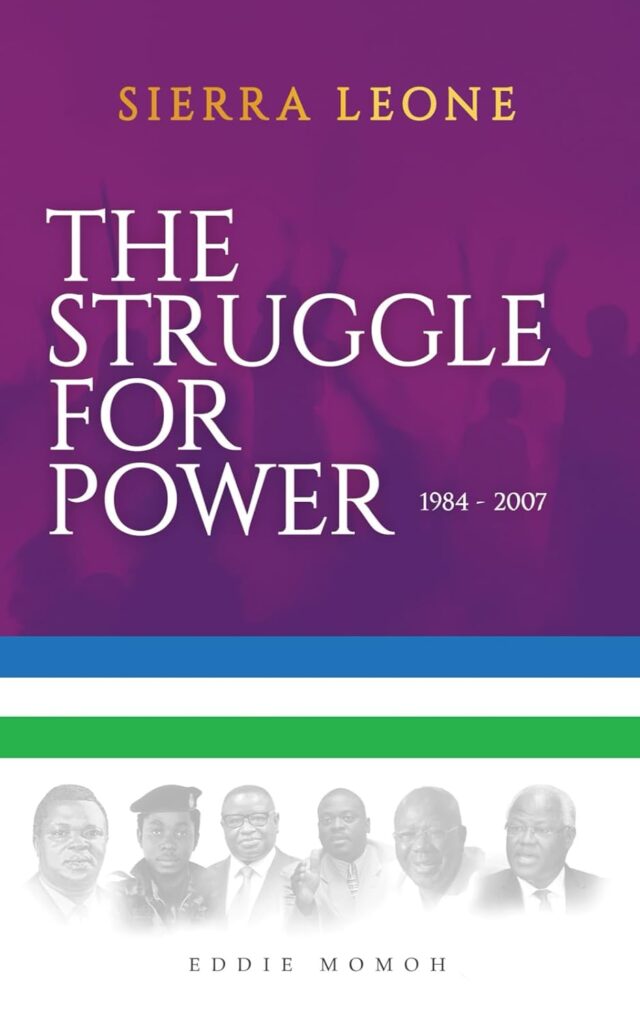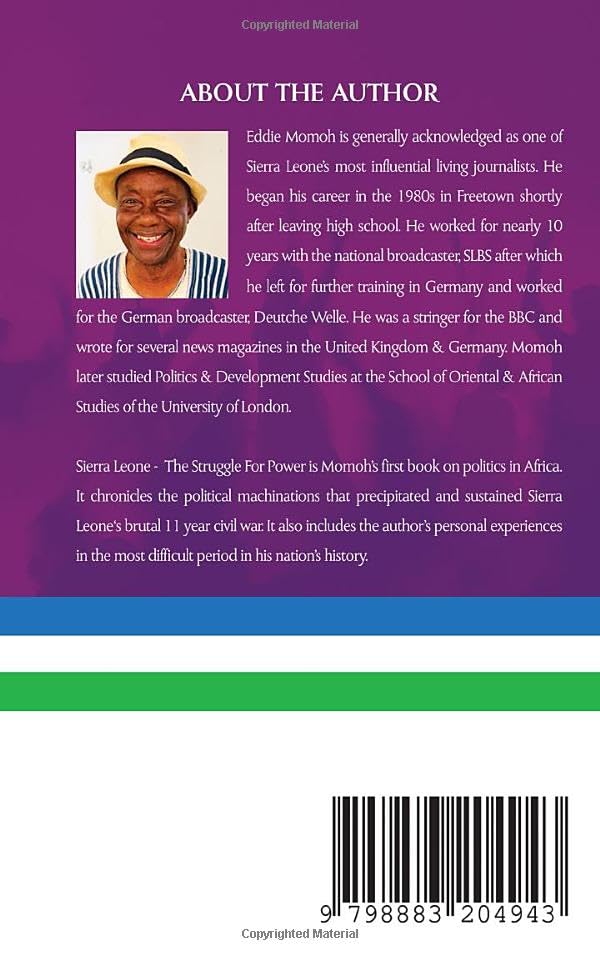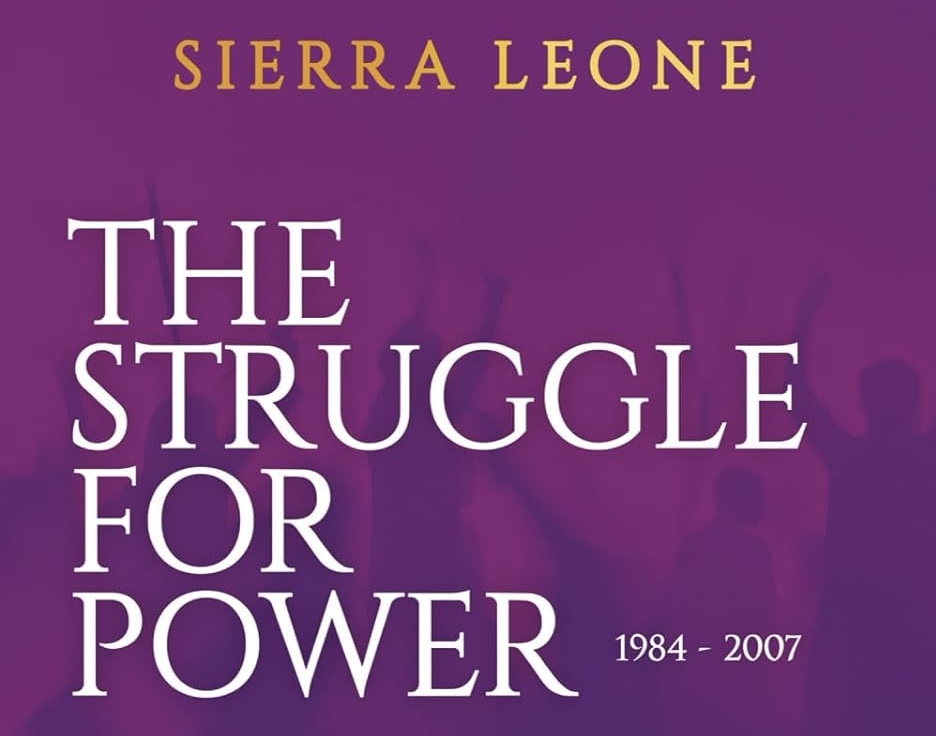This potted history of politics in Sierra Leone will give readers a better insight into why there is still so much political chaos in the country, finds Desmond Davies
EDDIE Momoh has done a great job of charting the course of political anarchy in Sierra Leone. Not for him an academic treatise that will end up befuddling readers. This is the work of an experienced journalist who knows how to present the information garnered in a riveting style.
It is a short read – 161 pages – but it will help Sierra Leoneans to better understand what they are currently witnessing in their country. Indeed, Sierra Leoneans need this potted history of politics in their nation because they tend to have short memories when it comes to the antics of their politicians.
This is why they are now surprised by how President Julius Maada Bio is carrying on. But, as Momoh points out, Bio always had a plan to become the leader of Sierra Leone. He followed this ruthlessly once he, Captain Valentine Strasser and other young army officers overthrew the rather laid-back President Joseph Momoh in 1992.
Momoh writes: “Bio, the 33rd child of Paramount Chief Charlie Vonie Bio, is a political schemer, and, according to those who know him well, devious, vindictive and highly ambitious.” Thus, as Bio manoeuvred, he got rid of Strasser, who was head of the Supreme Military Council and leader of the National Provisional Ruling Council (NPRC), to take charge of the country. Then he tried to foist himself on Sierra Leoneans as president.
It did not work because the people robustly opposed his plan. In 1996, Bio was forced to abandon his quest for power, and Tejan Kabbah became President under the aegis of the Sierra Leone People’s Party (SLPP).
But can one blame Bio? After all, born in 1964, three years after independence, he did not know any better. Bio grew up under the chicanery of President Siaka Stevens and his All People’s Congress (APC) which laid the foundations for political enmity and violence that the country is still grappling with.
Stevens had been stopped from becoming Prime Minister after the APC won the 1967 elections. Brigadier David Lansana intervened at State House minutes after the Governor General, Sir Henry Lightfoot-Boston, had sworn in Stevens. (By the way, Momoh wrongly stated in the book that it was Sir Maurice Dorman who was Governor General then. The Briton left Freetown in 1962 to be replaced by Sir Henry, a Sierra Leonean).

After a year in exile in Guinea, Stevens was restored to power through another coup, and for the next 24 years, the APC generally rode roughshod over Sierra Leoneans. The one saving grace for Stevens and the APC was that the economy was doing well, and the president was adept at handing out largesse to appease opponents.
Power, and excessive power for that matter, has been the hallmark of politics in Sierra Leone. Momoh writes: “By all accounts, the APC government’s first five years in office were marked by great economic improvement: the large trade deficit was transformed into a surplus while the country’s huge foreign debts were paid off or renegotiated.
“Against this backdrop, many APC leaders (no doubt instigated by the Prime Minister himself) started a campaign for Stevens to be given virtually unlimited power. It was the first clear sign that Stevens’ main political ambition was to disband other political parties and transform the country into a one-party state.”
On April 19, 1971, Sierra Leone controversially became a republic “through contortions and verbal subterfuge” after the APC had contrived to circumvent the Constitution. The act of Stevens becoming president would have been viewed as comical had it not been for the long-lasting consequences this move has had on politics in the country.
Momoh notes that three days after Sierra Leone became a republic, Prime Minister Stevens, “who had appointed a stooge in the person of Chief Justice C.O.E. Cole as ceremonial President, pushed several amendments to the 1971 Constitution through parliament to have himself installed as executive President”.
In the two years leading up to the next election in 1973, Stevens and the APC prepared the way for the first large-scale electoral violence in the country. The SLPP was so intimidated that it withdrew from the election, leaving the APC as the sole party in parliament.
But four years later, in 1977, the SLPP met fire with fire during the election campaign and managed to secure 10 seats in its South Eastern stronghold. This rattled Stevens and the APC, and a year later the country became an official one-party state with the SLPP MPs becoming members of the APC.
Momoh quotes an “impassioned” address by the leader of the SLPP, Salia Jusu-Sheriff, in parliament in May 1978: “The One-Party is now a fact of life and the One-Party Constitution has since become the first law of the land; this means that every Member of Parliament should now belong to the… APC…the only party recognised under the new One-Party Constitution.”
But this did not assuage the restiveness of Sierra Leoneans who felt that they had been once again short-changed by Stevens and the APC. Momoh writes: “Even after the introduction of the one-party system of government, there was still some restlessness and instability in many parts of Sierra Leone, especially in the SLPP stronghold [in] the South East.
“Many people were reluctant to accept the changes, as not only had they been denied the right to vote for the candidates of their choice, they also had no more representation in the Sierra Leone parliament.”
Thus by 1991, when Foday Sankoh and his Revolutionary United Front (RUF) began their incursion into Sierra Leone from Liberia, the seeds of discontent that had been sown long before then, were germinating. And in a most damaging way that saw the country facing death and destruction on a huge scale until peace was achieved in 2002.

In 22 short and sharp chapters, covering the whole gamut of contemporary politics in Sierra Leone, Momoh’s book lays the groundwork for deep introspection among Sierra Leoneans. Are they still willing to be a party to the ever-present double-dealing of their self-serving political leaders?
The politicians have been able to get their way for so long because they are backed by wealthy businessmen who bankroll political activities to their advantage. Is it any wonder that so many businesses in Sierra Leone operate as monopolies, thus making a mockery of the concept of an open market?
One businessman who called the shots for a long time was Jamil Sahid Mohamed, a Sierra Leonean-Lebanese who had great influence over the politicians. But in 1987, his nephew, Kazim Alie, was accused of treason, among others. Mohamed, who was then based in London, was not happy with the situation.
Momoh explains: “In several telephone calls to President Momoh, Jamil repeatedly threatened dire consequences – including a ‘bombing campaign’ that would kill all of Momoh’s ministers – if Alie was convicted and executed.
“To drive home his point, Jamil had requested that I convey this ominous-sounding message in person to the president, and I did this during a two-week visit to Sierra Leone. When I met President Momoh at State House with the message from a man he still called ‘my friend’, he looked worried and asked me if I thought Jamil was serious about the ‘bombing campaign’.
“I replied that he, Momoh, knew his ‘friend’ better than I did. ‘We’ll see what to do,’ Momoh told me after a while.”
Anecdotes, such as this one, are dotted in the book, giving it an air of authority. Indeed, Sierra Leoneans would do well to get a copy of the book for a better insight into why there is still so much political chaos in their country. Momoh himself suggests: “This book should be read in schools and colleges throughout Sierra Leone because of its unique sense of history.”
Now that Momoh has set the cat among the pigeons, it would be good for some of the dramatis personae in the book, such as Bio and former President Ernest Koroma – “whose policies were reminiscent of the root causes of the civil war” – to write their versions of events. They would make interesting reading – that is if Bio and Koroma ever get around to putting pen to paper.
Note: Desmond Davies is the Editor of Africa Briefing in London. This book review is in the current edition of the magazine: https://africabriefing.com/africa-briefing-magazine-may-june-2024/
